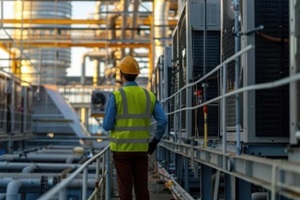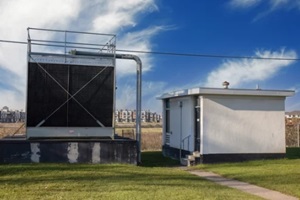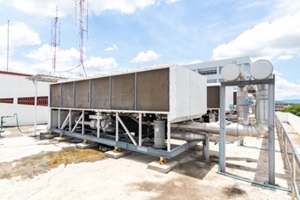 In recent years, New York’s HVAC regulations have tightened significantly, especially under Local Law 77. This law requires building owners and facility managers to closely monitor water treatment systems to ensure they meet outlined safety and compliance standards. While the primary goal of Local Law 77 is to eliminate Legionella bacteria and improve public health, an often-overlooked benefit is the improved efficiency of cooling tower systems.
In recent years, New York’s HVAC regulations have tightened significantly, especially under Local Law 77. This law requires building owners and facility managers to closely monitor water treatment systems to ensure they meet outlined safety and compliance standards. While the primary goal of Local Law 77 is to eliminate Legionella bacteria and improve public health, an often-overlooked benefit is the improved efficiency of cooling tower systems.
This dual focus on safety and efficiency represents a significant shift in how building systems are managed and maintained in New York City.
The Implications of New York’s HVAC Regulations
Local Law 77 mandates stringent monitoring and maintenance practices for cooling tower systems in New York City. At its core, the law aims to eliminate Legionella bacteria from water systems, which poses serious health risks, including Legionnaires’ disease. However, the measures required to comply with this law also lead to more efficient cooling tower operations. This synergy between safety and efficiency is changing the landscape of building management in the city.
The Role of Biofilm in Water Treatment Efficiency
One key aspect of Local Law 77 compliance is the elimination of biofilm, which is a sludgy layer of bacteria and microorganisms that can accumulate in water systems, and is where legionella bacteria can be harbored. Biofilm not only provides a protective environment for Legionella but also significantly reduces system efficiency by causing corrosion, blockages, and reduced heat transfer.
The presence of biofilm can lead to a cascade of issues, from decreased cooling capacity to increased energy consumption. Through the prevention of biofilm and Legionella, building owners not only comply with the law but also enhance the efficiency and lifespan of their cooling systems.
This dual benefit means that the stringent regulations of Local Law 77 naturally lead to more efficient cooling tower operations. The process of keeping systems clean for safety reasons inherently improves their performance, creating a win-win situation for building managers and occupants alike.
Practical Steps for Maintaining Compliance and Improving Efficiency
Meeting the requirements of Local Law 77 involves several practical steps that simultaneously improve system efficiency:
 Regular monthly monitoring and testing of water systems: Frequent water quality checks help detect issues early, preventing the buildup of harmful bacteria and scale. This proactive approach not only ensures compliance but also maintains optimal heat transfer efficiency in cooling towers, reducing energy consumption and extending equipment lifespan. By catching potential problems before they escalate, building managers can avoid costly repairs and system downtime.
Regular monthly monitoring and testing of water systems: Frequent water quality checks help detect issues early, preventing the buildup of harmful bacteria and scale. This proactive approach not only ensures compliance but also maintains optimal heat transfer efficiency in cooling towers, reducing energy consumption and extending equipment lifespan. By catching potential problems before they escalate, building managers can avoid costly repairs and system downtime.- Implementing a reliable water management plan: A comprehensive plan outlines procedures for monitoring, maintenance, and corrective actions. This systematic approach ensures consistent water quality, reducing the risk of sudden system failures and maintaining peak operational efficiency throughout the cooling season. A well-designed plan also helps streamline operations, making it easier for staff to maintain high standards of system performance.
- Using advanced water treatment technologies, such as smart controllers: These sophisticated systems continuously monitor water quality and automatically adjust treatment protocols. Smart controllers optimize chemical dosing and water usage, ensuring consistent compliance with regulations while significantly enhancing system efficiency. Notably, these controllers can perform the three times a week testing mandated by Local Law 77, streamlining compliance efforts. This data-driven approach maintains optimal water chemistry, maximizing system life and efficiency. The automation provided by smart controllers not only improves accuracy but also frees up staff time for other critical tasks.
- Performing scheduled cleanings and disinfections: Local Law 77 mandates annual summertime disinfections, known as hypohalogenations, and semi-annual tower cleanings prior to startup and before shutdown. These scheduled maintenance activities not only ensure compliance but also significantly enhance system efficiency by removing buildup and contaminants that can impede heat transfer and promote microbial growth.
By implementing these steps, building owners and facility managers can achieve the dual goals of regulatory compliance and improved cooling tower efficiency. This approach transforms the challenge of Local Law 77 compliance into an opportunity for operational optimization and cost savings. The integration of these practices into regular building management routines can lead to a more holistic and effective approach to system maintenance.
Benefits Beyond Compliance: Improved Efficiency and Cost Savings
While complying with Local Law 77 is mandatory, the benefits extend far beyond mere compliance. Improved water treatment efficiency leads to better-performing HVAC systems, resulting in significant cost savings. Efficient systems require less energy to operate, reducing utility bills and the building’s overall carbon footprint. This reduction in energy consumption aligns with broader sustainability goals and can enhance a building’s green credentials.
Clean, well-maintained cooling towers operate more efficiently, requiring less frequent repairs and replacements. This improved efficiency is a direct result of the stringent regulations imposed by Local Law 77, making better cooling tower performance a beneficial by-product of compliance. Over time, these efficiency gains can translate into substantial operational cost savings and improved tenant satisfaction due to more reliable building systems.
Moving Forward: Compliance, Efficiency, and Peace of Mind
 Local Law 77 sets a high bar for water treatment standards in New York City, but compliance is entirely achievable with the right approach. By prioritizing the elimination of Legionella and biofilm as part of their water management plan, building owners and facility managers can create a healthier environment for occupants while enjoying the benefits of more efficient and reliable cooling systems. This proactive stance on system management can also enhance a building’s reputation and value in the competitive New York real estate market.
Local Law 77 sets a high bar for water treatment standards in New York City, but compliance is entirely achievable with the right approach. By prioritizing the elimination of Legionella and biofilm as part of their water management plan, building owners and facility managers can create a healthier environment for occupants while enjoying the benefits of more efficient and reliable cooling systems. This proactive stance on system management can also enhance a building’s reputation and value in the competitive New York real estate market.
Investing in advanced water treatment technologies and creating management plans enables compliance with regulatory requirements while reaping the rewards of improved system efficiency, cost savings, and extended equipment lifespan. These investments pay dividends in the form of reduced operational costs, improved system reliability, and enhanced building performance.
For expert assistance in keeping your system compliant, efficient, and operating at its best, consider partnering with experienced water treatment professionals like Tower Water. Schedule a consultation to learn how you can turn Local Law 77 compliance into an opportunity for improved cooling tower efficiency and cost savings.
With the right expertise and approach, the challenges posed by stringent regulations can be transformed into a catalyst for building system optimization and operational excellence.
